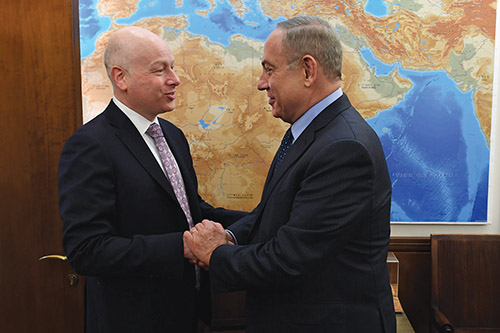
Jason Greenblatt, President Trump’s Special Representative for International Negotiations, and senior White House adviser Jared Kushner will arrive in Israel Wednesday ahead of talks with Israeli and Palestinian officials Thursday.
The visit, which takes place as part of a swing through the Middle East, will also include Deputy National Security Adviser Dina Powell.
Ahead of the visit, sources close to Palestinian Authority Chairman Mahmoud Abbas (Abu Mazen) said the Palestinian leader would give the Trump administration 45 days to declare a commitment to the two-state solution, or risk a Palestinian push on the international stage to declare Palestinian statehood.
The report of a Palestinian ultimatum, published Tuesday on the al-Monitor news website, followed Abbas’ complaints on Sunday to a delegation of left-wing Israeli MKs that the Trump administration is “in chaos” and has been unresponsive to Palestinian demands vis-a-vis Israel, especially the demand that Washington force Israel back to the negotiating table.
The report also followed remarks last week by Palestine Liberation Organization ambassador to Washington Husam Zomlot that American officials must “tell us where the hell they are going.”
Commenting on the visit, former National Security Adviser Maj. Gen. (res.) Yaakov Amidror said Tuesday that he did not believe any significant developments were on the cards. “I think that they are still in the process of learning. They thought that it is very simple, and slowly, slowly they are learning that it is very complicated. They’re still in the process of learning and this is a very important stage,” said Amidror.
“I would be very surprised if they announce something big, because you don’t announce big things when you are in the process of learning,” he added.
Meanwhile, Prime Minister Binyamin Netanyahu, who met today in the Black Sea resort of Sochi with Russian President Vladimir Putin for talks on Iran’s presence in Syria, is expected to capitalize on his meeting with Kushner and Greenblatt to bring up the cease-fire agreement in Syria, brokered last month by Washington and Russia. Netanyahu was critical of that deal, and Israeli leaders across the political spectrum fear the deal would leave a permanent Iranian military presence in close proximity to Israel’s northern and north-eastern borders.
By Andrew Friedman/TPS









